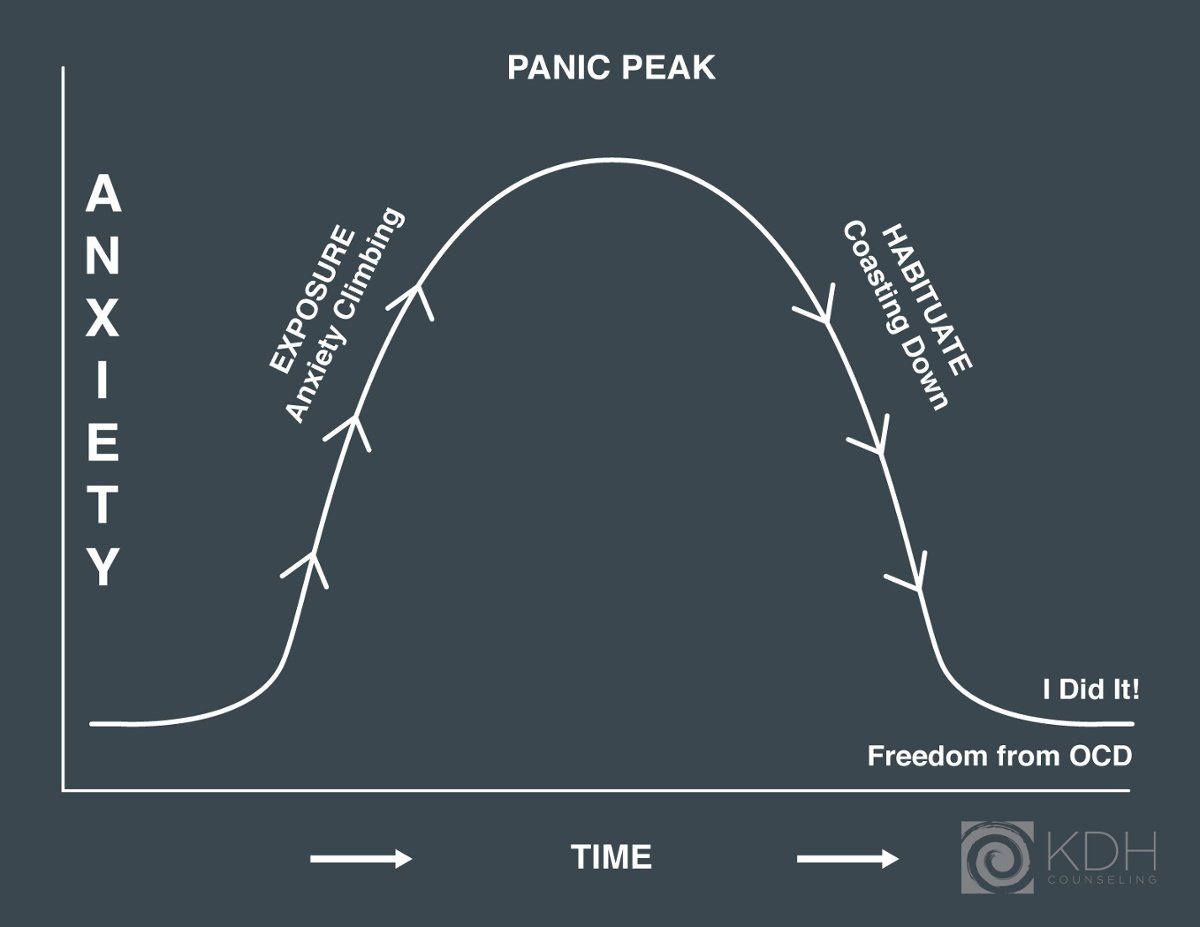My Story Through OverAchieving
Overachieving is comprised of emotional urges, habits, and so much lost time. I was constantly consumed by the urge to achieve, while outwardly it...
5 min read
KD HOLMES, LPC, EMDR CERTIFIED, BTTI TRAINED
:
Jul 25, 2022 12:22:00 PM

I began working with individuals who have OCD about 10 to 12 years ago. My journey into understanding OCD began in my graduate program, where I was introduced to the basics of the disorder. However, at that time, my understanding of its symptoms and treatment was limited, as OCD requires more specialized training and education. When someone first approached me with OCD symptoms seeking treatment, I found myself at a loss. This bafflement piqued my curiosity and propelled me into action.
Driven by a desire to truly understand OCD, I dove into learning. I started by reading books dedicated to the intricacies of OCD, reaching out to the local expert for guidance, and attending workshops. It was during this period of exploration that I learned about the Behavior Therapy Training Institute (BTTI) through the International OCD Foundation (IOCDF). Back then, securing a spot in the BTTI training seemed almost impossible—the slots would fill up within 20 minutes of being announced. Fortunately, times have changed, and it has become easier to participate in this invaluable training.
As I delved deeper into understanding OCD, I experienced a revelation about my own anxiety, which exhibited very OCD-like characteristics. Some individuals suffer from Generalized Anxiety Disorder (GAD), but their symptoms manifest with compulsive behaviors. I recognized patterns in myself, such as worrying excessively about potential illnesses, which led me to compulsively research symptoms and compulsively visiting doctors. I encountered intrusive thoughts and disturbing images that were difficult to shake off. I would obsess over making mistakes and compulsively seek reassurance by reviewing them with colleagues, constantly checking my memory of past events. This cycle of anxiety was excruciating.
In therapeutic approaches like Eye Movement Desensitization and Reprocessing (EMDR) and Cognitive Behavioral Therapy (CBT), the intention is often to "get rid" of anxiety. After 17 years in private practice, I have seen the same narrative repeatedly: clients, myself included, yearn to be free from anxiety. We desire liberation from the grip of OCD, but the essence of true freedom is often misunderstood. To cope, we tend to avoid triggers and engage in compulsive behaviors, which provide temporary relief from escalating anxiety. Unfortunately, this reinforces anxiety to our brains about these behaviors.
As I continue to work with OCD clients, I am committed to expanding my knowledge and refining my therapeutic strategies. My goal is to help individuals understand that true freedom from OCD comes not from avoidance, but from embracing and confronting the anxiety head-on. Through this repetitive process, I hope to guide others and myself toward a more profound understanding of OCD and the path to freedom.
Freedom is not merely the absence of obsessions; it involves learning to live with and tolerate the accompanying anxiety. This practice of co-existence trains our brain to not be terrified by the thoughts, feelings, or sensations that trigger obsessions. By gradually exposing ourselves to these triggers in a controlled manner, we can rewire our response over time. Exposure and Response Prevention (ERP), demonstrated in the image below, is a therapeutic method that supports this process, helping individuals build resilience and regain control over their lives.
Building tolerance for anxiety or uncertainty leads to habituation. Habituation is the reduction of a psychological or emotional response to a repeatedly encountered stimulus. It is a type of non-associative learning where an innate response diminishes after prolonged exposure to anxiety-inducing stimuli.
While habituation can occur in Exposure and Response Prevention (ERP), it is not guaranteed. Previously, it was believed that habituation was the reason ERP was effective; however, current research indicates that ERP’s success is due to Inhibitory Learning. Still, understanding habituation remains crucial as it formed the foundation of ERP.
In practical terms, what does habituation look like? For someone anxious about germs, it involves intentionally touching something perceived as contaminated and resisting the urge to perform compulsions, such as washing hands. This process is repeated multiple times daily over several weeks until the anxiety response diminishes, or habituates. For example, you might touch a doorknob, feel disgust, but refrain from cleaning or checking your memory.
Inhibitory learning involves developing a different experience of anxiety by building tolerance for it. This practice requires refraining from compulsive behaviors and confronting fear directly as it arises within you. Unlike the systematic approach of an exposure hierarchy, inhibitory learning can be applied to any obsession. For instance, touching a doorknob and experiencing disgust signals to your brain that compulsions are unnecessary for alleviating distress.
Inhibitory learning and exposure hierarchy can coexist and complement each other. They are not mutually exclusive. When using an exposure hierarchy, the objective should be to generate fear and uncertainty and sit with those feelings, rather than simply aiming to reduce anxiety. However, traditional Exposure and Response Prevention (ERP) focuses on habituation as its primary goal.
ERP (Exposure Response and Prevention) involves confronting your obsessions while refraining from compulsive behaviors, repeatedly. It is a way of existing, a method of embracing what frightens you. But what does "leaning in" mean? It means facing fear and anxiety head-on, not avoiding the issue, and resisting the urge to distract yourself or deny its reality. This process is known as inhibitory learning. By leaning into an obsession, one learns to tolerate anxiety and builds the confidence to endure discomfort.
What is habituation when it involves internal compulsion? Some refer to this as Pure O. Individuals with this condition may obsess about unknowingly harming others or causing harm through negligence. For example, one might fixate on the fear of having harmed someone in the past and incessantly revisit the memory. Another scenario could involve fearing harm to a family member while asleep. These obsessions often have external compulsions, such as seeking reassurance, but mostly revolve around memory checking.
Habituation involves creating an exposure script that envisions the feared scenario. You might think this sounds extreme, but these scripts are effective. After crafting the script, you read it several times a day over several weeks until it loses its power to scare you. I refer to it as a "torture script" because imagining your worst fears in detail can be terrifying. Initially, we will work on the scripts together in my office, so you won’t face it alone. The beauty of exposure scripts is that, over time, the fear diminishes. However, the goal isn't just to eliminate fear; it's about leaning into and confronting it, teaching you how to handle future anxiety.
Habituation and Inhibitory learning are complementary processes that, when combined, leads to a greater impact and enhanced learning. Habituation involves the gradual reduction of a response to repeated exposure to a stimulus, allowing individuals to become less sensitive over time. On the other hand, inhibitory learning focuses on intentionally focusing on the new learning to inhibit the old OCD learning. By integrating these processes, learners can achieve a more comprehensive understanding and mastery, ultimately leading to improved outcomes in treatment.
Most of my clients are people who initially believe that overcoming their fears is an impossible task. They often say things like, "There is no way that I can learn to face my greatest fears." However, I've witnessed time and again in my office that when individuals confront their fears repeatedly, their Obsessive-Compulsive Disorder (OCD) symptoms begin to improve significantly. I often compare OCD to a game of whack-a-mole; when you manage to suppress one fear or compulsion, another one tends to pop up. This illustrates that treatment is really about learning to manage how sensitive your brain is to perceived threats and avoiding the compulsive rabbit hole when something terrifying enters your mind.
This process of learning and adaptation is not one that you have to face alone. The beauty of this therapeutic approach is that it empowers people to face their most daunting fears and be free of them! In reality, this freedom is about coexisting with these fears because that's how our brains are naturally wired. So, after going through Exposure and Response Prevention (ERP) treatment, you might still have similar intrusive thoughts, but you will have learned how to lean into them, abstain from compulsive behaviors, and coexist peacefully with this aspect of your mind. This newfound ability will lead to experiencing less distress and, ultimately, achieving a sense of freedom from the grips of OCD. It’s about gaining mastery and confidence in managing your responses, leading to a more fulfilling and less anxiety-ridden life.
The truth is, ERP works. It works not because it erases fear, but because it rewires our relationship with it. In a culture that teaches us to run from discomfort, ERP invites us to lean in, to stay, to breathe. It's not easy. But it is possible. And in that possibility lies transformation.
If you're struggling with OCD, know this: your thoughts do not define you. You are not broken. You are not alone. And the path forward, though hard, is one worth walking. Together, step by step, exposure by exposure, you can reclaim your life.

Overachieving is comprised of emotional urges, habits, and so much lost time. I was constantly consumed by the urge to achieve, while outwardly it...

There is a particular kind of suffering that lives within people with POCD—a heavy, choking, and insessient nagging of what ifs. If these sufferers...

Trauma changes the brain, leaving a lasting imprint on a person’s mental and emotional well-being. It doesn’t merely exist as a distant memory;...